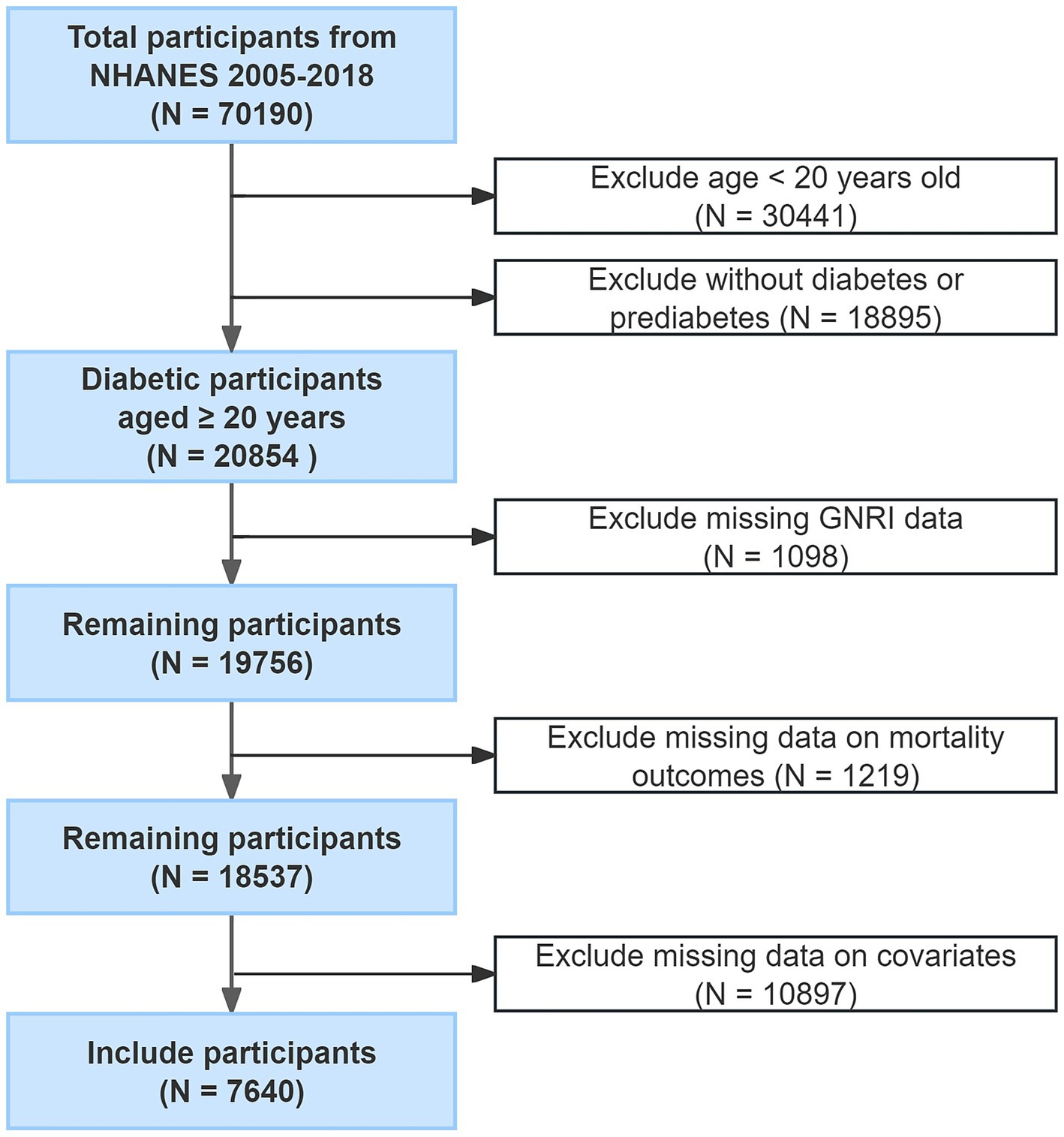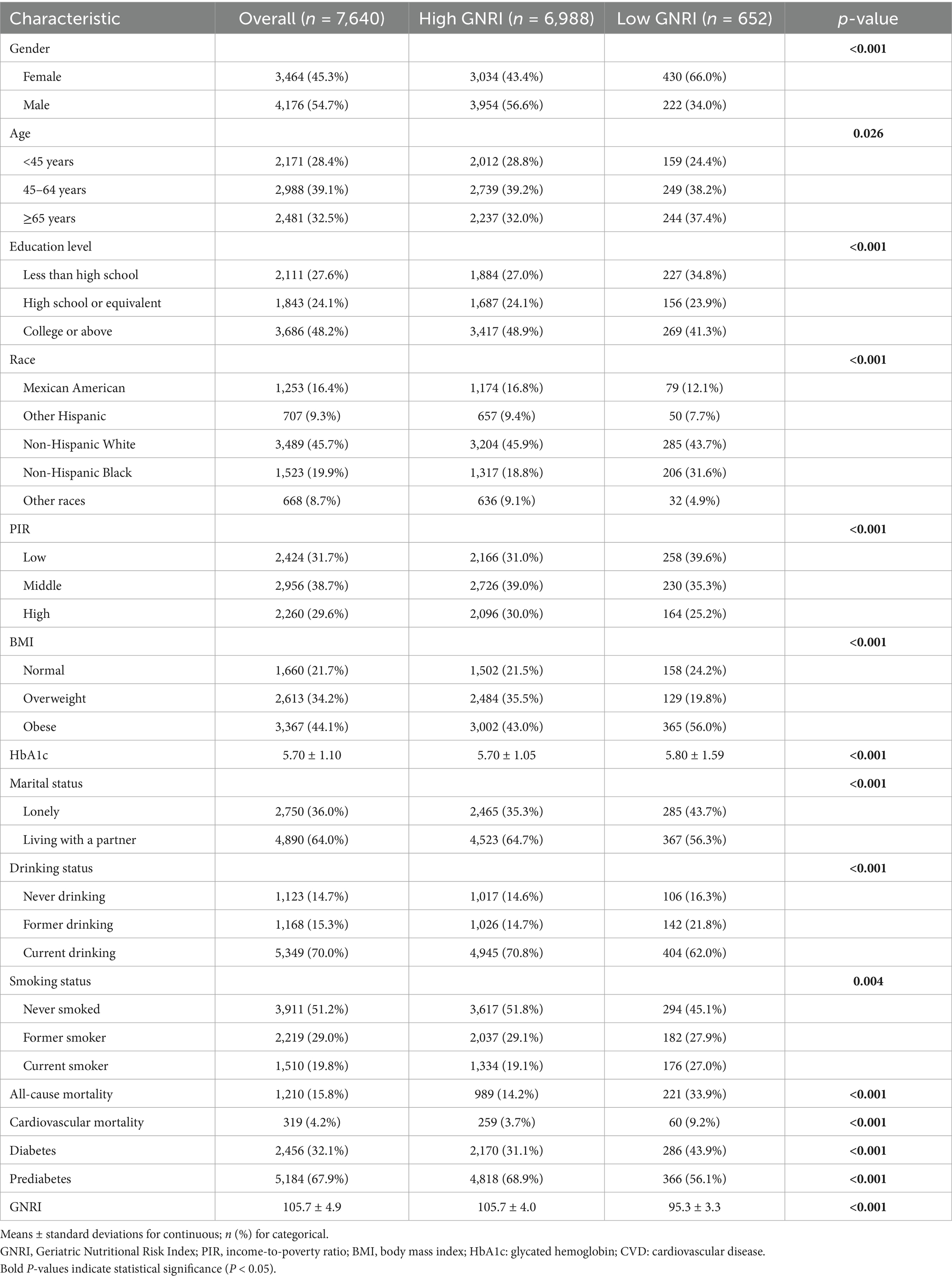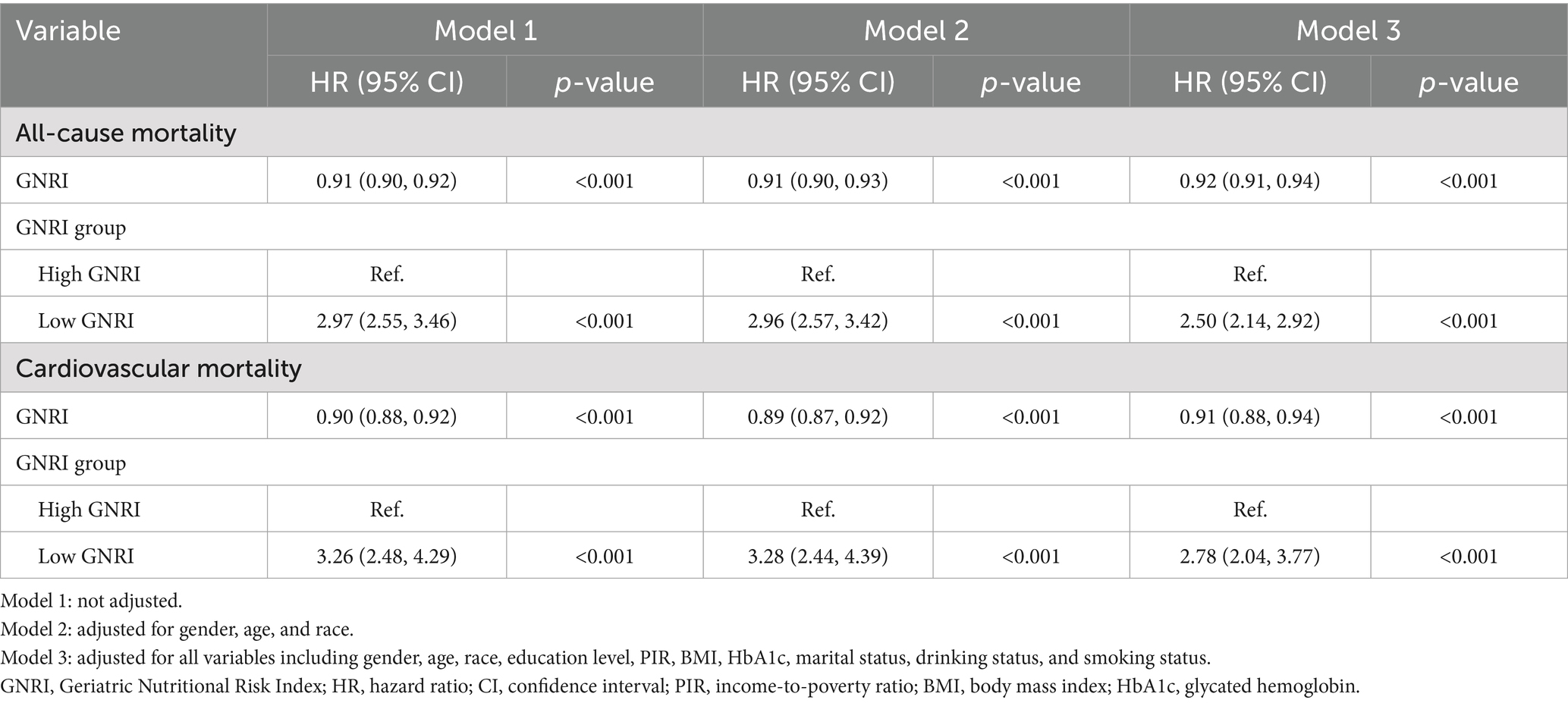- 1Department of Neurology, The Second Affiliated Hospital, Jiangxi Medical College, Nanchang University, Nanchang, China
- 2Department of Nephrology, Tongji Hospital, School of Medicine, Tongji University, Shanghai, China
Background: This study examines the relationship between Geriatric Nutrition Risk Index (GNRI) and all-cause and cardiovascular mortality in individuals with prediabetes and diabetes, aiming to guide clinical nutrition management and extend life expectancy.
Methods: We analyzed a weighted sample of 7,640 individuals with prediabetes and diabetes from the NHANES 2005–2018 and the NCI database. Nutritional status was assessed using the GNRI. Survival outcomes, including all-cause and cardiovascular mortality, were analyzed using Cox proportional hazards regression models and Kaplan–Meier survival curves. Subgroup analyses and restricted cubic spline (RCS) regressions were further conducted to evaluate the robustness and potential nonlinear relationships between GNRI and mortality outcomes.
Results: Over a median follow-up of 8.00 years, 1,210 participants died, including 319 from cardiovascular diseases. Kaplan–Meier curves revealed significantly lower survival rates for both mortalities in participants with low GNRI. Fully adjusted COX regression models revealed a 2.50-fold (95% CI: 2.14–2.92, p < 0.001) increased risk of all-cause mortality and a 2.78-fold (95% CI: 2.04–3.77, p < 0.001) increased risk of cardiovascular mortality in the low GNRI group. These associations remained robust across subgroup analyses. RCS analyses presented nonlinear associations between GNRI and both mortalities (both p-non-linear <0.05, p-overall <0.05).
Conclusion: GNRI demonstrated a significant, negative, and nonlinear association with all-cause and cardiovascular mortality in US individuals with prediabetes and diabetes, highlighting its utility in improving survival outcomes through nutritional assessment.
1 Introduction
The global prevalence of diabetes and prediabetes has reached alarming levels, posing a major public health crisis. Factors including aging populations, urbanization, reduced physical activity, and rising obesity rates contribute to this upward trend (1). The most recent IDF Diabetes Atlas estimates that 537 million people worldwide are living with diabetes, with projections reaching 700 million by 2045 (2). Additionally, prediabetes, characterized by impaired glucose tolerance and an intermediate stage between normal glucose regulation and diabetes, affects an even larger portion of the population and carriers a significant risk of progression to metabolic syndrome (MetS) and diabetes. Same as MetS, diabetes is a leading cause of mortality, with individuals facing a 2–3 times higher risk of all-cause mortality (3, 4), particularly from cardiovascular diseases (4–6). It underscores the importance of early intervention and management for this population.
Malnutrition represents a critical modifiable factor in the progression and clinical outcomes of prediabetes and prediabetes. Emerging evidence highlights its complicated impact, exacerbating disease severity via metabolic dysregulation while escalating microvascular/macrovascular complication risks (7, 8). This imbalance perpetuates glycemic instability and accelerates end-organ damage, forming a pathogenic cycle in diabetic patients. Recent studies have linked poor nutritional status in diabetic patients to higher morbidity and mortality through mechanisms such as neurological inflammation, oxidative stress, endothelial dysfunction, and intestinal microbiota (9–11). While obesity is a primary driver of MetS and a significant contributor to the pathogenesis of diabetes and cardiovascular diseases (12), these findings underscore the need for a holistic approach to dietary research, focusing on systemic nutritional studies rather than isolated dietary components to better evaluate dietary patterns’ synergistic metabolic health impacts (13).
The Geriatric Nutritional Risk Index (GNRI), introduced by Bouillanne et al. (14), combines serum albumin levels with actual and ideal body weight to assess nutritional status. GNRI has been shown to predict outcomes in various diseases, including diabetes (15), osteoporosis (16), prostate cancer (17), and chronic obstructive pulmonary disease (18), and is considered more reliable and less influenced by subjective factors than other tools like the Nutritional Risk Score (NRS-2002) and the Malnutrition Universal Screening Tool (MUST) (14, 17, 19, 20). Despite its established relevance in other conditions, there is limited evidence regarding the role of GNRI in the risk of all-cause and cardiovascular mortality in individuals with diabetes or prediabetes. Additionally, research on the nutritional status of participants with prediabetes is scarce. Therefore, this study aims to investigate the link between GNRI and all-cause and cardiovascular disease mortality among individuals with diabetes and prediabetes, filling a critical gap in the literature. Our findings will provide valuable insights into optimizing clinical nutrition management and improving prognosis in this high-risk population.
2 Methods
2.1 Participants
The NHANES, authorized by the Centers for Disease Control and Prevention, has aimed to provide a comprehensive and nationally representative sample to evaluate the health and nutrition of individuals in the United States in two-year cycles since 1999. The database contains information on demographics, diet, examination, laboratory tests, and questionnaires. The project adhered to the principles of the Declaration of Helsinki. Prior to taking part in the survey, all individuals provided their consent.
Initially, a total of 70,190 individuals based on seven survey cycles of the NHANES database from 2005 to 2018 participated. We enrolled participants with diabetes or prediabetes aged ≥20 years (n = 20,854). Individuals with missing data on GNRI (n = 1,098), mortality details (n = 1,219), and several covariates, including gender, age, education level, race, marital status, PIR, BMI, smoking status, and alcohol consumption (n = 10,897) were excluded from the analysis. Ultimately, 7,640 individuals with diabetes or prediabetes were enrolled in the final analysis (Figure 1). According to the American Diabetes Association (ADA) diagnosis and classification standards (21), participants with diabetes were defined as meeting any of the following criteria: fasting plasma glucose (FPG) ≥126 mg/dL, 2-h plasma glucose (2-h PG) ≥200 mg/dL, or glycated hemoglobin (HbA1c) ≥6.5%. Participants having self-reported doctor diagnosed diabetes (as indicated by the question “Doctor told you have diabetes” in the NHANES diabetes questionnaire) were also defined as having diabetes (22, 23). Patients with prediabetes were defined as meeting any of the following criteria: FPG between 100 and 125 mg/dL, 2-h PG between 140 and 199 mg/dL, or HbA1c between 5.7 and 6.5% (21).
2.2 Assessment of GNRI
We chose the GNRI to assess the nutritional status of individuals with diabetes and prediabetes, which is computed using albumin, weight, and height. The GNRI (14) was defined as GNRI = [1.489 × serum albumin (g/L)] + [41.7 × weight (kg)/ideal weight (kg)], ideal weight = 22 × height (m) × height (m). If a participant’s weight was higher than the ideal weight, the weight/ideal weight ratio was regarded as 1. Although there is no universally accepted criterion for categorizing GNRI, we classified it into two groups based on previous literature (18, 24), using a cutoff value of 98: low GNRI group (<98) and high GNRI group (≥98).
2.3 Determination of mortality
All participants in our study were eligible for mortality follow-up. The primary outcomes were all-cause and cardiovascular mortality. The National Center for Health Statistics (NCHS) linked data with death certificate records by matching identification codes from the National Death Index (NDI). Consequently, we obtained mortality details from https://www.cdc.gov/nchs/data-linkage/mortality.htm. We used the MORTSTAT variable to ascertain each participant’s final survival status, which is assigned a vital status code (0 = assumed alive, 1 = assumed deceased), and the UCOD_LEADING variable to identify the leading cause of death code. All-cause mortality was defined as any reason for death. Cardiovascular mortality was defined according to the 10th revision of the International Classification of Diseases (ICD-10) coding, including I00–I09, I11, I13, and I20–I51. The follow-up time (PERMTH_INT) was calculated from each participant’s initial interview date to the end of the mortality period or December 31, 2018.
2.4 Covariates
This study gathered data on various factors from the NHANES Mobile Examination Center questionnaire and examination measurements, including gender, age, education level (less than high school, high school or equivalent, college or above) (25), race (Mexican American, other Hispanics, non-Hispanic White, non-Hispanic Black, other races), family income-to-poverty ratio (PIR), body mass index (BMI), HbA1c, marital status (living with a partner, lonely) (25), drinking status, and smoking status. PIR was categorized as low (<1.3), middle (1.3–3.5), and high (≥3.5) (26). BMI was divided into normal (<25 kg/m2), overweight (25–30 kg/m2), and obese (≥30 kg/m2) (27). Drinking status was categorized as never, former, or current drinking. Smoking status was categorized as never smoked, former smoker, and current smoker (18, 28).
2.5 Statistical analysis
In the analysis, we weighted the sample to ensure it accurately represented the whole US population. The baseline characteristics were presented and divided into two groups by GNRI. Continuous variables were described as mean ± standard deviation, while categorical variables were shown as numbers and percentages. To compare differences between the GNRI groups, the chi-squared test or Wilcoxon rank-sum test was applied for categorical and continuous variables, respectively.
We performed weighted multivariate Cox regression analyses to estimate hazard ratios (HRs) and 95% confidence intervals (CIs) for the relationship between GNRI and all-cause and cardiovascular mortality. The study was conducted across three progressively adjusted models: Model 1 (unadjusted), Model 2 (adjusted for gender, age, and race), and Model 3 (further adjusted for education level, PIR, BMI, HbA1c, marital status, drinking status, and smoking status).
Furthermore, we employed Kaplan–Meier survival analyses to evaluate the survival probabilities concerning all-cause and cardiovascular death. To deeper explore the dose–response relationships between GNRI and mortality outcomes in individuals with prediabetes and diabetes, we utilized a restricted cubic spline (RCS) model with four knots. Additionally, subgroup analyses and interaction tests were conducted on the fully adjusted model to investigate the heterogeneity of these associations across different subgroups.
All statistical analyses were performed using R version 4.2.2, and p < 0.05 was considered statistically significant.
3 Results
3.1 Baseline characteristics
A total of 7,640 participants from NHANES 2005–2018 were included in our study, with 5,184 diagnosed with prediabetes and 2,456 with diabetes. Table 1 displays the characteristics of the entire cohort stratified by their GNRI classification. Specifically, 6,988 participants were categorized in the high GNRI group, while 652 were in the low GNRI group. The majority of the cohort were male and aged between 45 and 64 years. Participants in the low GNRI group were more prone to be female, 45–64 years old, non-Hispanic White, obese, living with a partner, current drinkers, never smoked, and have college or above education, a low PIR, and higher HbA1c (p < 0.05). The low GNRI groups exhibited higher risks of all-cause and cardiovascular mortality compared to the high GNRI group.
3.2 Association of GNRI with mortality outcomes
Over a median follow-up period of 8.00 years (IQR: 5.17–11.08), 1,210 all-cause mortality events were recorded, including 319 deaths due to cardiovascular causes. Cox proportional hazards regression revealed a significant inverse association between GNRI and the risk of both all-cause and cardiovascular death, whether GNRI was treated as a continuous or categorical variable. In the fully adjusted model, each unit increase in GNRI corresponded to an 8% reduction in all-cause mortality risk and a 9% reduction in cardiovascular mortality risk. Stratified analyses revealed that individuals in low GNRI exhibited a 2.50-fold (95% CI: 2.14–2.92, p < 0.001) and 2.78-fold (95% CI: 2.04–3.77, p < 0.001) increased risk of all-cause and cardiovascular mortality, respectively, compared to those with high GNRI (Table 2). Furthermore, Kaplan–Meier survival curves confirmed that the survival probability was significantly greater in the high GNRI group than in the low GNRI group for both outcomes (p < 0.001) (Figure 2).
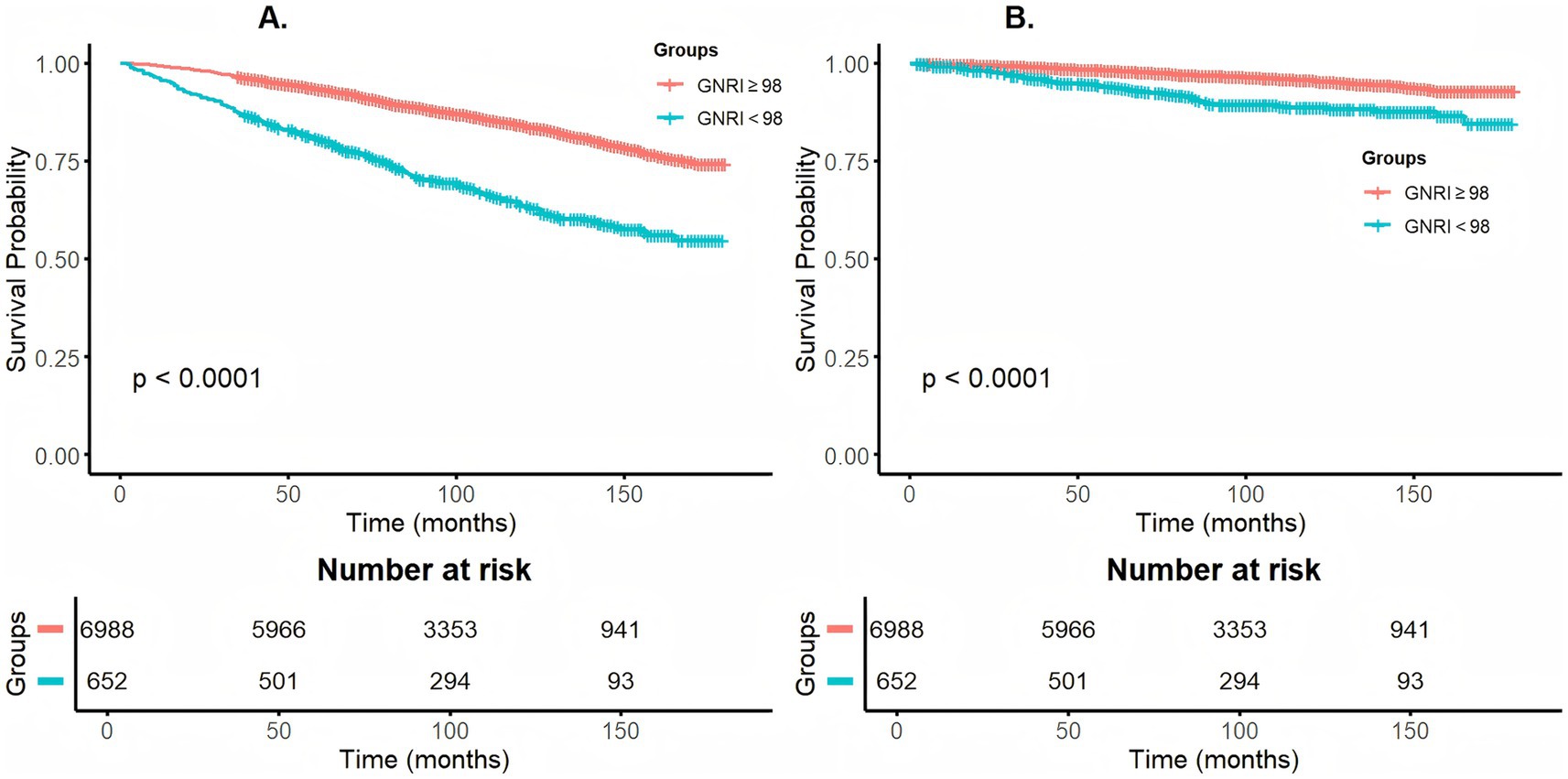
Figure 2. Kaplan–Meier analyses for all-cause (A) and cardiovascular mortality (B) among participants with prediabetes and diabetes.
3.3 Dose–response relationship analysis
To investigate the dose–response relationships between the GNRI and mortality rates among individuals with prediabetes and diabetes, we employed RCS analysis within a fully adjusted Cox regression model. The RCS curves revealed nonlinear relationships between GNRI and both all-cause and cardiovascular mortality (A: p-non-linear <0.001, p overall <0.001; B: p-non-linear = 0.0117, p overall <0.001). A significant trend was observed, with all-cause and cardiovascular mortality risk decreasing substantially as GNRI increased, particularly for GNRI values below 104.19 (Figure 3).
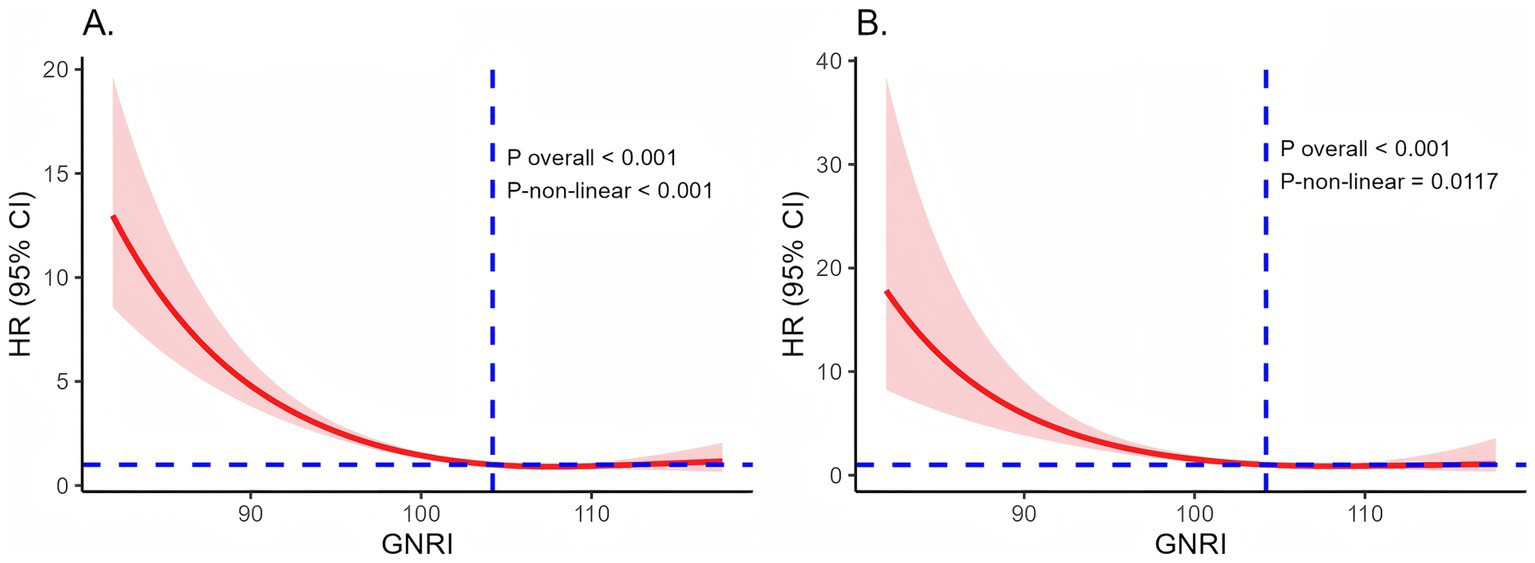
Figure 3. Dose–response relationships of GNRI and all-cause (A) and cardiovascular mortality (B). Adjusted for gender, age, race, education level, PIR, BMI, marital status, drinking status, and smoking status. HR, hazard ratio; CI, confidence interval; GNRI, Geriatric Nutritional Risk Index; PIR, income-to-poverty ratio; BMI, body mass index.
3.4 Subgroup analysis
We conducted a stratified analysis further to investigate the relationship between GNRI and mortality outcomes, stratifying participants by gender, age, education level, and marital status (Figure 4). Interaction tests indicated no significant differences in the relationship between GNRI and all-cause mortality across these subgroups, suggesting a stable relationship in the populations with prediabetes and diabetes (all p for interaction >0.05). For cardiovascular mortality, interaction terms for age, gender, and marital status were not statistically significant (p for interaction >0.05), indicating stability across these subgroups. However, education level showed a significant interaction with GNRI (p for interaction = 0.009). The relationship of GNRI with cardiovascular mortality was significant in individuals with prediabetes and diabetes with a high school education or above, while no significant association was found in those with less than a high school education. This finding highlights the potential influence of education level on the relationship between GNRI and cardiovascular mortality. Moreover, we comprehensively examined the associations under different glycemic metabolic states and BMI. As shown in Supplementary Table S2, GNRI was significantly associated with both all-cause and cardiovascular mortality in both the prediabetes and diabetes groups, and no significant interaction was observed between glycemic metabolic states and the association of GNRI with mortality outcomes (p for interaction <0.05). It also showed that GNRI remains a reliable indicator of nutritional risk even in the presence of obesity (Supplementary Table S5). This additional analysis supports the validity of our approach and reinforces the applicability of the GNRI across various glycemic metabolic and body weight statuses.
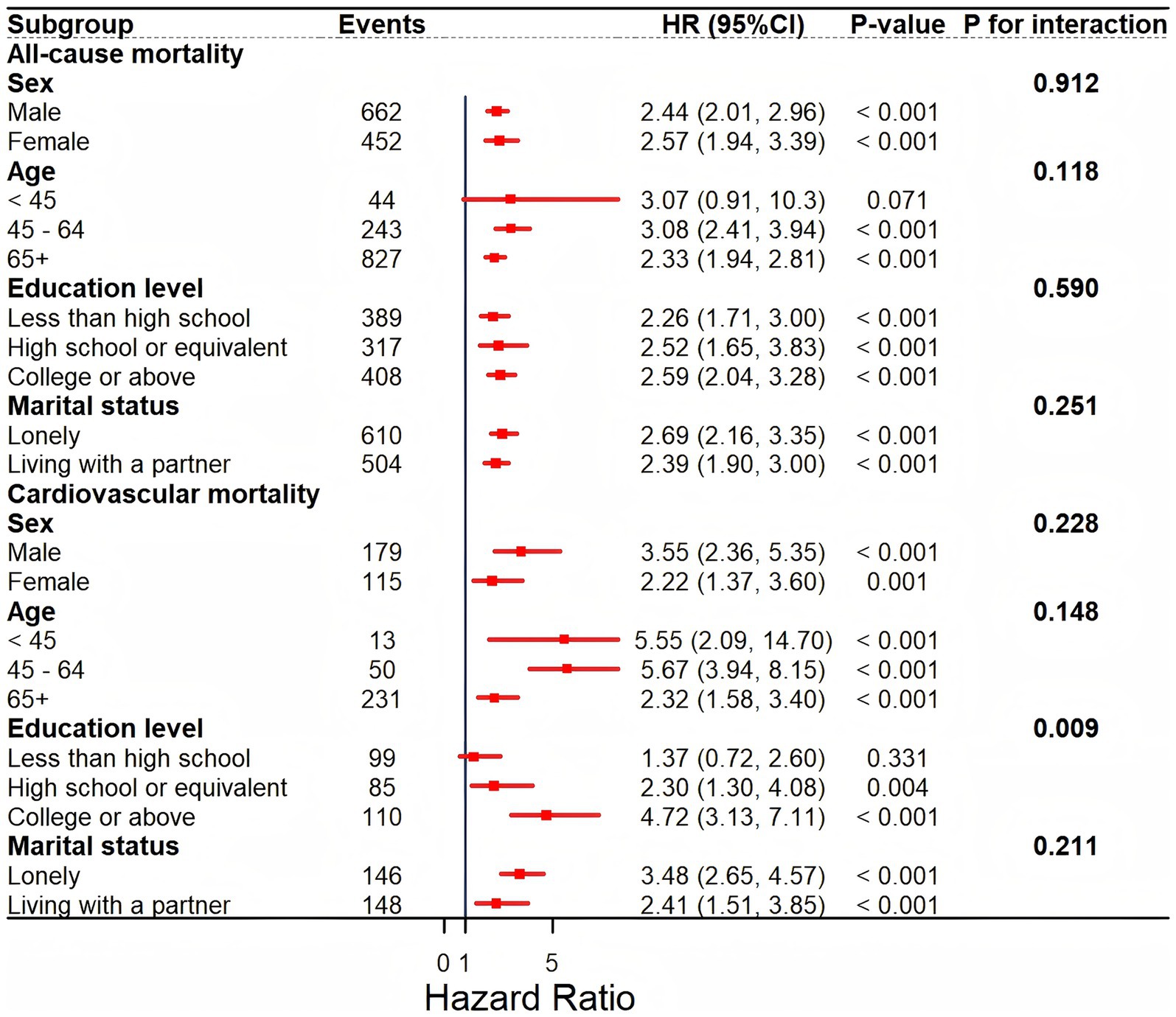
Figure 4. Subgroup analysis of the associations between GNRI and all-cause and cardiovascular mortality.
4 Discussion
Our study advances this field by including individuals with prediabetes, thereby addressing the entire spectrum of diabetes and its early stages. Utilizing a nationally representative NHANES cohort with extended follow-up, we demonstrated that GNRI levels exhibited a negative association with the risks of all-cause and cardiovascular mortality among individuals with diabetes and prediabetes in the United States. This association was consistent across various subgroups. Additionally, dose–response analysis identified nonlinear associations between GNRI and mortality outcomes. Interaction tests identified education level as a significant interaction in the relationship between GNRI and cardiovascular mortality. These findings underscore the importance of early nutritional assessment and intervention in diabetes and prediabetes management, providing actionable insights for clinical practice and public health strategies.
Due to the effects of diet on inflammatory response, abnormal glucose metabolism, insulin resistance, and so on (29, 30), dietary management serves as one of the five cornerstones of lifestyle therapy for patients with prediabetes and diabetes, yet malnutrition can accelerate disease progression and increase mortality risk. Previous studies have established a clear link between poor nutritional status and increased mortality risk (31). For instance, Bonilla-Palomas et al. (32) and Arques et al. (33) utilized serum albumin level as a biomarker for nutritional status, demonstrating that hypoalbuminemia in acute heart failure patients was associated with higher hospital mortality rates. Similarly, large cohort studies and meta-analyses have identified hypoalbuminemia as a robust predictor of increased all-cause and cardiovascular mortality in hospitalized and non-hospitalized patients, regardless of comorbidities (34). In addition to serum albumin, BMI was commonly employed to evaluate nutritional status. Elevated BMI is linked to a heightened risk of several chronic diseases (3), such as cardiovascular disease, type 2 diabetes, chronic kidney disease, cancers, and musculoskeletal disorders. These conditions collectively contribute to increased global mortality rates (35). However, these traditional indicators have limitations in comprehensively assessing nutritional risk, underscoring the need for more integrated and multidimensional approaches.
The GNRI, which combines albumin levels with weight and height, offers a more reliable assessment of nutritional status, minimizing the effects of confounding factors on serum albumin or BMI alone. GNRI’s comprehensive nature effectively captures both acute stimuli and chronic reactions (36, 37). Recent studies suggest that it may also be applicable to younger populations, providing a comprehensive nutritional assessment tool for a broader demographic (38). Derived from but different from the Nutritional Risk Index (NRI) (39), GNRI is calculated using ideal body weight (40) rather than usual body weight. The Mini Nutritional Assessment (MNA) and the NRS-2002 are commonly employed to evaluate nutritional status. However, the MNA, despite its validated in a variety of settings, has a slightly weaker prognostic power due to its 30-question format (41). The NRS-2002 has a subjective nature and an inevitable requirement for reporting eating habits (42). Overall, the GNRI offers a highly convenient and accurate assessment of the nutritional status across a broad demographic.
Our findings indicated a negative relationship between GNRI and the rate of all-cause and cardiovascular mortality among individuals with diabetes and prediabetes in the United States. This relationship remained significant even after stratified analyses by gender, age, education level, and marital status. In the fully adjusted model, individuals in the low level of GNRI had a 1.50-fold increased risk of all-cause mortality and a 1.78-fold increased risk of cardiovascular mortality compared to those in the high GNRI group. Similarly, the Fukushima cohort study included 946 type 2 diabetes patients and defined renal, cardiovascular events, and all-cause death as endpoints. Their finding demonstrated that poor nutritional status, assessed by GNRI, has an association with adverse outcomes among diabetic individuals (43). Another analysis focusing on osteosarcopenia in older diabetic patients also showed that GNRI has a comprehensive clinical evaluation role of nutritional status and is helpful for early identification of those at high risk for osteosarcopenia (44). Additionally, studies concerning chronic kidney disease patients in the United States and the United Kingdom have shown that GNRI has a strong predictive capacity for the incidence of CKD and the risk of mortality (24). Our results are consistent with these previous studies.
Despite there may be differences in disease progression, development, and complications between prediabetes and diabetes, the predictive trends of the GNRI with respect to mortality risk remains similar across these two groups. This consistency is likely due to the shared underlying pathophysiological mechanisms that characterize both conditions. Strict restrictions on carbohydrate intake, coupled with an increased demand for dietary protein, have led to a growing prevalence of malnutrition in patients with diabetes and prediabetes. The relationship between abnormal glucose regulation and malnutrition is complex and multifaceted, with numerous studies shedding light on the underlying mechanisms that exacerbate each other. Consistent with the findings reported by Bourke et al. (45), immune dysfunction is both a cause and consequence of malnutrition. Malnutrition is associated with inflammatory and immune responses, which leads to increased levels of systemic proinflammatory mediator and immune cell activation (46). Similarly, Wang et al. (47) has the same finding that diabetic patients with elevated high high-sensitivity C-reactive protein level and malnutrition had a significantly higher risk of all-cause mortality compared to those with only one of these conditions. Inadequate dietary intake of essential nutrients can worsen insulin dysregulation and contribute to the progression of diabetes-related complications and MetS. Furthermore, malnutrition, particularly protein and calorie deficiencies, reduces the availability of essential amino acids and glucose, both of which are critical signals for insulin release. Chronic malnutrition, especially in the context of diabetes or prediabetes, can further impair β-cell and pancreatic activity (46). Additionally, chronic malnutrition can lead to hypoalbuminemia, which may result in oedema, especially in the gastrointestinal tract. The breakdown of the gastrointestinal barrier, exacerbated by malnutrition, increases the translocation of bacteria and toxins, further intensifying inflammatory reactions (48). Ultimately, it accelerates the decline in life expectancy.
Our study, which involved weighting the data, was a large-scale population-based survey that provided nationally representative results, making the findings generalizable to the general US individuals with prediabetes and diabetes. We employed Cox regression, RCS regression, and stratified analyses to demonstrate that nutritional status serves as a modifiable factor in the development of mortality among these individuals. However, our study does have limitations. First, due to the limited sample size and follow-up period, the median survival time has not yet been reached, and the Kaplan–Meier survival curves for all-cause and cardiovascular mortality showed no difference. Future studies could incorporate a larger sample size and extended follow-up period to ensure that survival differences can be detected. Second, nutritional status was assessed using GNRI only at baseline. Changes in serum albumin and weight during the follow-up period may have affected the relationship between GNRI and mortality. Additionally, owing to the inherent limitations of the NHANES database, crucial metabolic indicators like diabetes duration, types of glucose-lowering medication, and comorbidities lack complete recorded data, making it impossible to adequately account for the influence of these factors.
5 Conclusion
The GNRI shows a tight negative connection with all-cause and cardiovascular mortality among individuals with prediabetes and diabetes. Improving the nutrition early may protect these populations’ survival rates. Incorporating the GNRI index into routine evaluation can help early identification and treatment of diabetes and prediabetes.
Data availability statement
Publicly available datasets were analyzed in this study. This data can be found at: National Health and Nutrition Examination Survey: https://wwwn.cdc.gov/nchs/nhanes/Default.aspx.
Ethics statement
The studies involving humans were approved by National Center for Health Statistics Research Ethics Review Board. The studies were conducted in accordance with the local legislation and institutional requirements. Written informed consent for participation was not required from the participants or the participants’ legal guardians/next of kin in accordance with the national legislation and institutional requirements.
Author contributions
LQ: Conceptualization, Data curation, Formal analysis, Writing – original draft. TL: Conceptualization, Data curation, Methodology, Writing – review & editing. JP: Data curation, Validation, Writing – original draft. QX: Software, Validation, Writing – original draft. MW: Investigation, Visualization, Writing – original draft. YL: Conceptualization, Supervision, Writing – review & editing. ZT: Funding acquisition, Supervision, Writing – review & editing.
Funding
The author(s) declare that financial support was received for the research and/or publication of this article. This work was supported by the Science and Technology Innovation 2030-Major Project (2021ZD0201805) and the National Natural Science Foundation of China (Grant no. 82060214).
Acknowledgments
The authors acknowledge people who contributed to the NHANES database.
Conflict of interest
The authors declare that the research was conducted in the absence of any commercial or financial relationships that could be construed as a potential conflict of interest.
Generative AI statement
The authors declare that no Gen AI was used in the creation of this manuscript.
Publisher’s note
All claims expressed in this article are solely those of the authors and do not necessarily represent those of their affiliated organizations, or those of the publisher, the editors and the reviewers. Any product that may be evaluated in this article, or claim that may be made by its manufacturer, is not guaranteed or endorsed by the publisher.
Supplementary material
The Supplementary material for this article can be found online at: https://www.frontiersin.org/articles/10.3389/fnut.2025.1625281/full#supplementary-material
References
1. International Diabetes Federation. (2024). Facts & figures. Available online at: https://idf.org/about-diabetes/diabetes-facts-figures/ (Accessed February 26, 2025).
2. Magliano, DJ, and Boyko, EJIDF Diabetes Atlas 10th edition Scientific Committee. IDF Diabetes Atlas. Brussels: International Diabetes Federation (2021).
3. Kim, HJ, Kim, KW, Jung, CW, Lee, JY, Choi, JY, Kim, BS, et al. Association of variabilities in body mass index and metabolic parameters with post-kidney transplantation renal outcomes. Sci Rep. (2024) 14:26973. doi: 10.1038/s41598-024-78079-x
4. Yang, JJ, Yu, D, Wen, W, Saito, E, Rahman, S, Shu, XO, et al. Association of diabetes with all-cause and cause-specific mortality in Asia: a pooled analysis of more than 1 million participants. JAMA Netw Open. (2019) 2:e192696. doi: 10.1001/jamanetworkopen.2019.2696
5. An, Y, Zhang, P, Wang, J, Gong, Q, Gregg, EW, Yang, W, et al. Cardiovascular and all-cause mortality over a 23-year period among Chinese with newly diagnosed diabetes in the Da Qing IGT and diabetes study. Diabetes Care. (2015) 38:1365–71. doi: 10.2337/dc14-2498
6. Bragg, F, Li, L, Smith, M, Guo, Y, Chen, Y, Millwood, I, et al. Associations of blood glucose and prevalent diabetes with risk of cardiovascular disease in 500,000 adult Chinese: the China Kadoorie biobank. Diabet Med. (2014) 31:540–51. doi: 10.1111/dme.12392
7. Magkos, F, Hjorth, MF, and Astrup, A. Diet and exercise in the prevention and treatment of type 2 diabetes mellitus. Nat Rev Endocrinol. (2020) 16:545–55. doi: 10.1038/s41574-020-0381-5
8. Yang, R, Lei, Q, Liu, Z, Shan, X, Han, S, Tang, Y, et al. Relationship between timing of coffee and tea consumption with mortality (total, cardiovascular disease and diabetes) in people with diabetes: the U.S. National Health and Nutrition Examination Survey, 2003–2014. BMC Med. (2024) 22:526. doi: 10.1186/s12916-024-03736-x
9. Forouhi, NG, Misra, A, Mohan, V, Taylor, R, and Yancy, W. Dietary and nutritional approaches for prevention and management of type 2 diabetes. BMJ. (2018) 361:k2234. doi: 10.1136/bmj.k2234
10. Hu, Y, Liu, G, Yu, E, Wang, B, Wittenbecher, C, Manson, JE, et al. Low-carbohydrate diet scores and mortality among adults with incident type 2 diabetes. Diabetes Care. (2023) 46:874–84. doi: 10.2337/dc22-2310
11. Wang, B, Fu, Y, Tan, X, Wang, N, Qi, L, and Lu, Y. Assessing the impact of type 2 diabetes on mortality and life expectancy according to the number of risk factor targets achieved: an observational study. BMC Med. (2024) 22:114. doi: 10.1186/s12916-024-03343-w
12. Fojas, EG, Haidery, A, Naseeb, S, and Naemi, R. Type 2 diabetes and cardiovascular conditions prediction in individuals with metabolic syndrome-associated lipoprotein lipase gene (LPL) single nucleotide polymorphisms (SNPs). J Diabetes Complicat. (2025) 39:109003. doi: 10.1016/j.jdiacomp.2025.109003
13. Eilat-Adar, S, and Goldbourt, U. Nutritional recommendations for preventing coronary heart disease in women: evidence concerning whole foods and supplements. Nutr Metab Cardiovasc Dis. (2010) 20:459–66. doi: 10.1016/j.numecd.2010.01.011
14. Bouillanne, O, Morineau, G, Dupont, C, Coulombel, I, Vincent, JP, Nicolis, I, et al. Geriatric Nutritional Risk Index: a new index for evaluating at-risk elderly medical patients. Am J Clin Nutr. (2005) 82:777–83. doi: 10.1093/ajcn/82.4.777
15. Huang, X, and Li, R. Research progress of type 2 diabetes and Geriatric Nutritional Risk Index. Adv Clin Med. (2023) 13:9535–40. doi: 10.12677/acm.2023.1361335
16. Huang, W, Xiao, Y, Wang, H, and Li, K. Association of Geriatric Nutritional Risk Index with the risk of osteoporosis in the elderly population in the NHANES. Front Endocrinol. (2022) 13:965487. doi: 10.3389/fendo.2022.965487
17. Miao, S, Bao, C, Zhang, Y, Wang, L, Jin, X, Huang, B, et al. Associations of the Geriatric Nutritional Risk Index with high risk for prostate cancer: a cross-sectional study. Nutrition. (2023) 115:112164. doi: 10.1016/j.nut.2023.112164
18. Chai, X, Chen, Y, Li, Y, Chi, J, and Guo, S. Lower Geriatric Nutritional Risk Index is associated with a higher risk of all-cause mortality in patients with chronic obstructive pulmonary disease: a cohort study from The National Health and Nutrition Examination Survey 2013–2018. BMJ Open Respir Res. (2023) 10:e001518. doi: 10.1136/bmjresp-2022-001518
19. Abd-El-Gawad, WM, Abou-Hashem, RM, El Maraghy, MO, and Amin, GE. The validity of geriatric nutrition risk index: simple tool for prediction of nutritional-related complication of hospitalized elderly patients. Comparison with Mini Nutritional Assessment. Clin Nutr. (2014) 33:1108–16. doi: 10.1016/j.clnu.2013.12.005
20. Kondrup, J, Allison, SP, Elia, M, Vellas, B, and Plauth, M. ESPEN guidelines for nutrition screening 2002. Clin Nutr. (2003) 22:415–21. doi: 10.1016/s0261-5614(03)00098-0
21. American Diabetes Association. 2. Classification and diagnosis of diabetes: standards of medical care in diabetes—2021. Diabetes Care. (2020) 44:S15–33. doi: 10.2337/dc21-S002
22. Xu, Z, Liu, D, Zhai, Y, Tang, Y, Jiang, L, Li, L, et al. Association between the oxidative balance score and all-cause and cardiovascular mortality in patients with diabetes and prediabetes. Redox Biol. (2024) 76:103327. doi: 10.1016/j.redox.2024.103327
23. Yin, J, Huang, Y, Liu, G, Wang, L, Shan, Z, and Liu, L. Trends in dietary macronutrient composition and diet quality among US adults with diagnosed and undiagnosed elevated glycemic status: a serial cross-sectional study. Am J Clin Nutr. (2022) 115:1602–11. doi: 10.1093/ajcn/nqac061
24. Zou, P, Zhang, Y, Chen, L, Liu, M, Nie, H, Gao, H, et al. Associations between the Geriatric Nutritional Risk Index and the risk of and mortality associated with chronic kidney disease in older individuals. BMC Public Health. (2024) 24:2893. doi: 10.1186/s12889-024-20283-5
25. Lu, Y, Zhou, T, Shen, Y, and Zhou, M. The association between triglyceride glucose index and suicidal ideation in American adults: results from NHANES 2005 to 2018. Medicine. (2024) 103:e40011. doi: 10.1097/MD.0000000000040011
26. Li, X, Liu, M, and Wang, G. The neutrophil-lymphocyte ratio is associated with all-cause and cardiovascular mortality in cardiovascular patients. Sci Rep. (2024) 14:26692. doi: 10.1038/s41598-024-76836-6
27. Liu, M, Gou, Y, Zou, B, Li, X, and Yang, P. Association between serum cotinine and total testosterone in adult males based on NHANES 2011–2016. Sci Rep. (2024) 14:23042. doi: 10.1038/s41598-024-74482-6
28. Zhang, TY, Zhang, ZM, Wang, XN, Kuang, HY, Xu, Q, Li, HX, et al. Relationship between weight-adjusted-waist index and all-cause and cardiovascular mortality in individuals with type 2 diabetes. Diabetes Obes Metab. (2024) 26:5621–9. doi: 10.1111/dom.15929
29. Papakonstantinou, E, Oikonomou, C, Nychas, G, and Dimitriadis, GD. Effects of diet, lifestyle, chrononutrition and alternative dietary interventions on postprandial glycemia and insulin resistance. Nutrients. (2022) 14:823. doi: 10.3390/nu14040823
30. Shapira, N. The metabolic concept of meal sequence vs. satiety: glycemic and oxidative responses with reference to inflammation risk, protective principles and Mediterranean diet. Nutrients. (2019) 11:2373. doi: 10.3390/nu11102373
31. Omran, ML, and Morley, JE. Assessment of protein energy malnutrition in older persons, part II: laboratory evaluation. Nutrition. (2000) 16:131–40. doi: 10.1016/S0899-9007(99)00251-8
32. Bonilla-Palomas, JL, Gámez-López, AL, Moreno-Conde, M, López-Ibáñez, MC, Anguita-Sánchez, M, Gallego de la Sacristana, A, et al. Hypoalbuminemia in acute heart failure patients: causes and its impact on hospital and long-term mortality. J Card Fail. (2014) 20:350–8. doi: 10.1016/j.cardfail.2014.01.016
33. Arques, S, Roux, E, Stolidi, P, Gelisse, R, and Ambrosi, P. Usefulness of serum albumin and serum total cholesterol in the prediction of hospital death in older patients with severe, acute heart failure. Arch Cardiovasc Dis. (2011) 104:502–8. doi: 10.1016/j.acvd.2011.06.003
34. Manolis, AA, Manolis, TA, Melita, H, Mikhailidis, DP, and Manolis, AS. Low serum albumin: a neglected predictor in patients with cardiovascular disease. Eur J Intern Med. (2022) 102:24–39. doi: 10.1016/j.ejim.2022.05.004
35. Gao, Q, Chao, W, Xu, J, and Yu, W. Global trends in ischemic stroke burden attributable to high BMI. Medicine. (2024) 103:e40196. doi: 10.1097/MD.0000000000040196
36. Cereda, E, and Vanotti, A. The new Geriatric Nutritional Risk Index is a good predictor of muscle dysfunction in institutionalized older patients. Clin Nutr. (2007) 26:78–83. doi: 10.1016/j.clnu.2006.09.007
37. Cereda, E, Zagami, A, Vanotti, A, Piffer, S, and Pedrolli, C. Geriatric Nutritional Risk Index and overall-cause mortality prediction in institutionalised elderly: a 3-year survival analysis. Clin Nutr. (2008) 27:717–23. doi: 10.1016/j.clnu.2008.07.005
38. Liu, YW, Tsai, CH, Chou, SE, Su, WT, Li, C, Hsu, SY, et al. Geriatric Nutritional Risk Index in screening malnutrition among young adult and elderly trauma patients. Formosan J Surg. (2021) 54:183–90. doi: 10.4103/fjs.fjs_44_21
39. Buzby, GP, Knox, LS, Crosby, LO, Eisenberg, JM, Haakenson, CM, McNeal, GE, et al. Study protocol: a randomized clinical trial of total parenteral nutrition in malnourished surgical patients. Am J Clin Nutr. (1988) 47:366–81. doi: 10.1093/ajcn/47.2.366
40. Matsuzawa, Y, Tokunaga, K, Kotani, K, Keno, Y, Kobayashi, T, and Tarui, S. Simple estimation of ideal body weight from body mass index with the lowest morbidity. Diabetes Res Clin Pract. (1990) 10:S159–64. doi: 10.1016/0168-8227(90)90157-o
41. Guigoz, Y. The mini nutritional assessment (MNA) review of the literature—what does it tell us? J Nutr Health Aging. (2006) 10:466–85.
42. Yu, M, Li, X, Chen, M, Liu, L, Yao, T, Li, J, et al. Prognostic potential of nutritional risk screening and assessment tools in predicting survival of patients with pancreatic neoplasms: a systematic review. Nutr J. (2024) 23:17. doi: 10.1186/s12937-024-00920-w
43. Fujiwara, M, Kimura, H, Tanaka, K, Saito, H, Shimabukuro, M, Asahi, K, et al. Association between malnutrition and adverse renal outcomes in patients with type 2 diabetes. J Diabetes Investig. (2024) 16:100–7. doi: 10.1111/jdi.14339
44. Duan, X, Chhetri, JK, Sun, L, Mu, Z, Fu, J, and Xiu, S. Low Geriatric Nutritional Risk Index is associated with osteosarcopenia in older patients with type 2 diabetes mellitus. BMC Musculoskelet Disord. (2024) 25:959. doi: 10.1186/s12891-024-08091-9
45. Bourke, CD, Berkley, JA, and Prendergast, AJ. Immune dysfunction as a cause and consequence of malnutrition. Trends Immunol. (2016) 37:386–98. doi: 10.1016/j.it.2016.04.003
46. Rajamanickam, A, Munisankar, S, Dolla, CK, Thiruvengadam, K, and Babu, S. Impact of malnutrition on systemic immune and metabolic profiles in type 2 diabetes. BMC Endocr Disord. (2020) 20:168. doi: 10.1186/s12902-020-00649-7
47. Wang, J, Chen, L, Huang, Z, Lu, J, Yang, Y, Zhao, X, et al. A synergistic association between inflammation, malnutrition, and mortality in patients with diabetics. Front Nutr. (2022) 9:872512. doi: 10.3389/fnut.2022.872512
Keywords: nutritional status, Geriatric Nutritional Risk Index, diabetes, prediabetes, all-cause mortality, cardiovascular mortality
Citation: Qiao L, Li T, Peng J, Xie Q, Wu M, Li Y and Tang Z (2025) Geriatric Nutritional Risk Index and mortality in individuals with prediabetes and diabetes: a longitudinal cohort study. Front. Nutr. 12:1625281. doi: 10.3389/fnut.2025.1625281
Edited by:
Shaojie Liu, First Affiliated Hospital of Xiamen University, ChinaReviewed by:
Jiayi Deng, Longyan First Hospital Affiliated to Fujian Medical University, ChinaJing Fan, Fudan University, China
Copyright © 2025 Qiao, Li, Peng, Xie, Wu, Li and Tang. This is an open-access article distributed under the terms of the Creative Commons Attribution License (CC BY). The use, distribution or reproduction in other forums is permitted, provided the original author(s) and the copyright owner(s) are credited and that the original publication in this journal is cited, in accordance with accepted academic practice. No use, distribution or reproduction is permitted which does not comply with these terms.
*Correspondence: Zhenyu Tang, dGFuZ3p5anJAMTYzLmNvbQ==
 Luyao Qiao
Luyao Qiao Te Li2
Te Li2 Zhenyu Tang
Zhenyu Tang